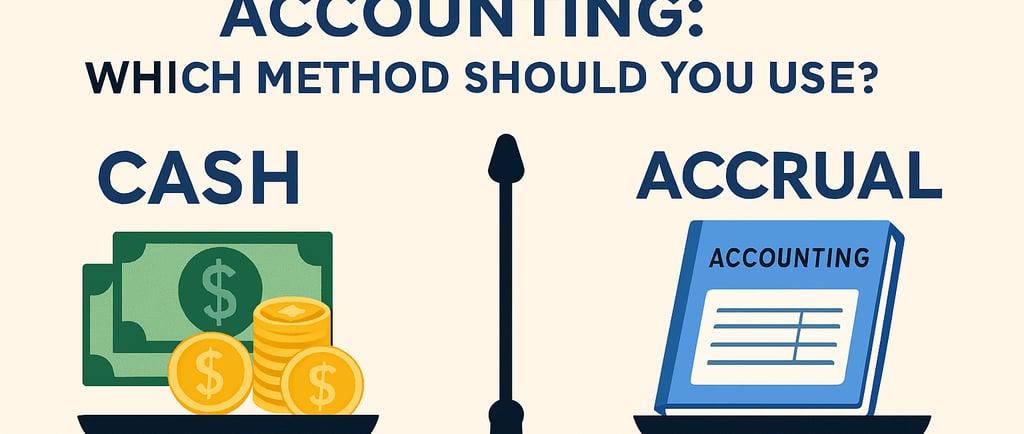Cash vs. Accrual Accounting: Which Method Should You Use?
Cash vs. accrual accounting explained—learn the pros, cons, tax impacts, and how to choose the bookkeeping method that fits your small business.


Cash vs. Accrual Accounting: Which Method Should You Use?
When it comes to managing your business finances, one of the most important decisions you’ll make is choosing your accounting method. The two primary options are cash accounting and accrual accounting, and the choice affects everything from how you track revenue and expenses to how you plan for taxes.
Whether you’re a new entrepreneur or a seasoned business owner rethinking your financial strategy, understanding the differences between these methods will help you choose the approach that fits your goals, operations, and compliance requirements.
What Is Cash Accounting?
Cash accounting is the simpler of the two methods.
In cash accounting, you record income when you actually receive the money and expenses when you actually pay the bill.
Example:
You send an invoice to a client in January.
They pay you in February.
Under cash accounting, you record that revenue in February — the month you got paid.
Pros of Cash Accounting:
Simplicity – Easy to understand and track.
Clear cash flow picture – You always know exactly how much cash is on hand.
Lower costs – Typically easier (and cheaper) to maintain.
Cons of Cash Accounting:
Less accurate for long-term planning – Doesn’t match income to the expenses that generated it.
Potential tax surprises – If you receive a lot of payments at the end of the year, you could face a higher tax bill.
Not GAAP-compliant – Larger businesses and those with inventory may not be allowed to use it.
Who It’s Best For:
Freelancers and solo entrepreneurs
Very small businesses without inventory
Service-based businesses where payment happens quickly after service
What Is Accrual Accounting?
Accrual accounting records income when it’s earned and expenses when they’re incurred, regardless of when the money changes hands.
Example:
You send an invoice to a client in January for work you did in that month.
They pay you in February.
Under accrual accounting, you record that revenue in January — when you earned it.
Pros of Accrual Accounting:
More accurate financial picture – Matches revenue with the expenses that generated it.
Better for planning and analysis – You can see profitability more clearly.
Required for many businesses – Generally accepted accounting principles (GAAP) and the IRS require certain businesses to use accrual.
Cons of Accrual Accounting:
More complex – Requires tracking accounts receivable and accounts payable.
Cash flow can be harder to track – You may show profit on paper while having little actual cash.
May require professional help – Most small business owners work with a bookkeeper or accountant for accrual.
Who It’s Best For:
Businesses with inventory
Businesses that want a true picture of profitability
Businesses seeking loans or investment
Which Method Should You Choose?
Here are a few decision factors to help guide you:
Size of Your Business
Smaller businesses often start with cash accounting for simplicity.
If you expect to grow quickly, you may want to start with accrual to avoid a disruptive switch later.
Your Industry
Product-based businesses with inventory almost always need accrual.
Service-based businesses may have more flexibility.
Your Tax Strategy
Cash accounting can sometimes allow for tax deferrals by delaying invoicing until the next tax year.
Accrual offers fewer timing advantages but a more accurate performance picture.
Your Goals
If you need precise financial data for investors or lenders, accrual is the way to go.
If you’re mainly focused on cash management, cash accounting may suffice.
Switching Between Methods
You’re not locked into one method forever.
However, switching from cash to accrual (or vice versa) requires IRS approval and careful adjustments to avoid misstating income. A professional bookkeeper can help you navigate this process to ensure your financials remain accurate and compliant.
The Bottom Line
There’s no one-size-fits-all answer.
Cash accounting is great for simplicity and cash management.
Accrual accounting is better for a complete financial picture and long-term growth planning.
Choosing the right method early on can save you headaches later — and making the wrong choice can create reporting issues, tax problems, or confusion about your business’s true financial health.
Need Help Deciding?
At Acctually, we specialize in helping small businesses and entrepreneurs set up bookkeeping systems that work for them — whether that means cash, accrual, or a hybrid approach.
We’ll not only help you pick the right method but also ensure your books are accurate, compliant, and giving you the insights you need to grow.
📞 Schedule a free consultation today and take the guesswork out of your bookkeeping.
📧 Email us at hello@acctually.com
🌐 Visit us at https://acctually.com/
📞 Call us at (646) 543-4916
